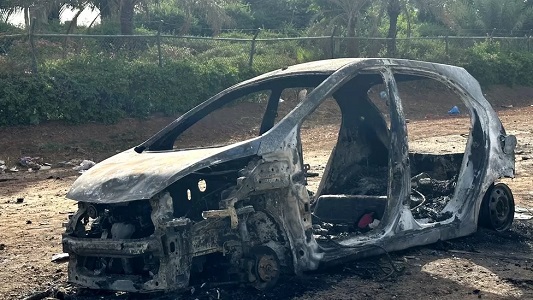

Fighting has intensified in Sudan’s capital, Khartoum, shattering the latest ceasefire aimed at allowing people to flee to safety.
On Sunday the army said it was attacking the city from all directions, with air strikes and heavy artillery, to flush out its paramilitary rivals.
The truce was due to end at midnight on Sunday. Millions remain trapped in the capital, where food is running short.
The first major aid flight, laden with medical supplies, has arrived in Sudan.
The International Committee of the Red Cross (ICRC) says a plane landed at Port Sudan with eight tonnes of relief supplies, including health kits for hospitals.
“With hostilities still ongoing, ICRC teams will need guarantees of safe passage from the parties to the conflict to deliver this material to medical facilities in locations with active fighting, such as Khartoum,” a statement said.
More than 70% of health facilities in the capital have been forced to close as a result of the fighting that erupted on 15 April.
More than 500 people have been reported killed, with the actual total number of dead and injured expected to be much higher.
The fighting pits the regular army against the paramilitary Rapid Support Forces (RSF).
Army commander Gen Abdel Fattah al-Burhan and RSF chief Gen Mohamed Hamdan Dagalo, better known as Hemedti, are vying for power – and disagree in particular about plans to include the RSF into the army.
Foreign countries have been evacuating their nationals amid the chaos.
Thursday night’s agreement to extend an uneasy ceasefire followed intensive diplomatic efforts by neighbouring countries, the US, UK and UN. But the 72-hour extension has not held.
By Saturday evening, heavy fighting had resumed in Khartoum. The army said it had conducted operations against RSF troops north of the city centre.
Eyewitnesses told Reuters news agency that army drones had targeted RSF position near a major oil refinery.
“We woke up once again to the sound of fighter jets and anti-aircraft weapons blasting all over our neighbourhood,” one resident told AFP news agency on Sunday.
BBC diplomatic correspondent Paul Adams, who is monitoring events from Nairobi in Kenya, says the army will find it difficult to expel the RSF from Khartoum.
For all the army’s superior firepower, the RSF are highly mobile and more suited to urban warfare, our correspondent adds.
BBC/Simeon Ugbodovon
Subscribe to our Telegram and YouTubeChannels also join our Whatsapp Update Group